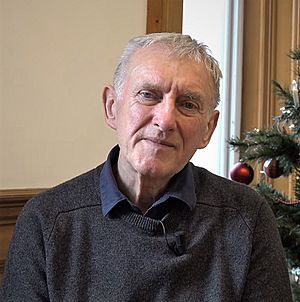James Kelman facts for kids
Quick facts for kids
James Kelman
|
|
|---|---|

Kelman speaks to Librairie Mollat about La route de Lafayette, French-language version of Dirt Road, in 2019
|
|
| Born | 9 June 1946 Glasgow, Scotland |
| Occupation | Writer |
| Nationality | Scottish |
| Genre | Stream of consciousness, absurdist fiction, paranoid fiction |
| Notable works | A Disaffection (1989) How Late It Was, How Late (1994) Kieron Smith, Boy (2008) |
| Notable awards | Booker Prize 1994: How Late It Was, How Late Saltire Awards 2008: Kieron Smith, Boy |
| Spouse | Marie Connors, m. 1969 |
James Kelman was born on June 9, 1946. He is a famous writer from Scotland. He writes novels, short stories, plays, and essays. His stories often show what people are thinking inside their minds. These characters are usually from working-class backgrounds. They often struggle with rules or how they interact with others. Most of his stories are set in his hometown of Glasgow.
Kelman's writing style often uses "stream of consciousness." This means the story flows like a character's thoughts. His books can feel a bit intense, showing characters trying to survive.
His novel A Disaffection was nominated for the Booker Prize in 1989. It also won the James Tait Black Memorial Prize. Kelman won the 1994 Booker Prize for his book How Late It Was, How Late. In 1998, he received the Glenfiddich Spirit of Scotland Award. His 2008 novel Kieron Smith, Boy won two major Scottish literary awards. These were the Saltire Society's Book of the Year and the Scottish Arts Council Book of the Year.
In 2024, the Saltire Society gave Kelman a Lifetime Achievement Award. This award recognized his important contributions to Scottish literature. His writings and papers are kept at the National Library of Scotland.
Contents
Life and Writing Journey
James Kelman was born and grew up in Glasgow, Scotland. He lived in areas like Govan and Drumchapel. He came from a normal family with four brothers. His mother stayed home, and his father made picture frames. Kelman left school when he was 15 years old.
He decided to become a writer when he was about 21 or 22. He wanted to write stories that came from his own life. He wanted to share the experiences of people from his community. Kelman felt that his writing was influenced by two main styles. These were "European Existential" and "American Realist" writing. He also liked the "modernist" movement in literature. Some writers who inspired him include Émile Zola, Albert Camus, Franz Kafka, and James Joyce.
Writing Short Stories
James Kelman started publishing his short stories in the 1970s. He joined a writing group in Glasgow. Other famous Scottish writers were also part of this group. His stories began to appear in different magazines.
His short stories had a special style. They often used a first-person voice. This means the story is told from one character's point of view. He used everyday language and speech patterns from Glasgow. Kelman's style has inspired many Scottish writers who came after him. These include Irvine Welsh and Janice Galloway.
In 1998, Kelman won the Stakis Prize for "Scottish Writer of the Year." This was for his collection of short stories called The Good Times. A film was made in 2012 based on his short story "Greyhound For Breakfast."
Writing Novels
Kelman's first novel was The Busconductor Hines, published in 1984. His novel A Disaffection was nominated for the Booker Prize in 1989. It also won the James Tait Black Memorial Prize. He won the 1994 Booker Prize for How Late It Was, How Late. This is one of the most important awards for English-language novels.
His 2008 novel Kieron Smith, Boy won two major Scottish awards. These were the Saltire Society's Book of the Year and the Scottish Arts Council Book of the Year. Kelman's most recent novel is God's Teeth and Other Phenomena, published in 2022.
Writing for the Stage
James Kelman also wrote a play called Hardie and Baird: The Last Days. This play was about the Radical Rising of 1820. It was performed at the Traverse Theatre in Edinburgh in 1990.
Views on Society and Community
James Kelman is known for being a writer who cares about social issues. He is also active in his community. When Glasgow was named "City of Culture," Kelman was part of a group called "Workers' City." This group wanted to remind people about Glasgow's working-class history. They felt it was important to remember the city's true roots.
Kelman has supported groups that help unemployed people. He also supports centers that work for social justice. He believes in helping people and communities. He has spoken out on issues of fairness and equality.
Kelman has also shared his thoughts on Scottish independence. He believes that any form of nationalism needs to be carefully considered. However, he supports Scotland becoming an independent country. He has also shared his thoughts on how arts funding works in Scotland.
Personal Life
In 1969, James Kelman married Marie Connors. She is from South Wales. They live in Glasgow with their children. Kelman has also lived in other places, including London, Manchester, Australia, and America.
Awards and Recognitions
- 1987: Cheltenham Prize for Literature (for Greyhound for Breakfast)
- 1989: James Tait Black Memorial Prize (for A Disaffection)
- 1994: Booker Prize (for How Late It Was, How Late)
- 1994: Writers’ Guild Award for Best Fiction (for How Late It Was, How Late)
- 1998: Glenfiddich Spirit of Scotland Award
- 1998: Stakis Prize for Scottish Writer of the Year (for The Good Times)
- 2009: Scottish Arts Council Book of the Year Award (for Kieron Smith, Boy)
- 2009: Aye Write Prize (for Kieron Smith, Boy)
- 2009: Saltire Award (for Kieron Smith, Boy)
- 2024: Saltire Society Lifetime Achievement Award
See also
 In Spanish: James Kelman para niños
In Spanish: James Kelman para niños

